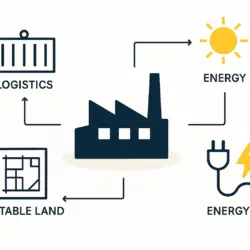Angola is significantly expanding its refining capacity with the construction of three new refineries, aiming to increase its output from the current 65,000 barrels per day to 425,000 barrels per day once these facilities are completed. This major expansion includes the 200,000 barrels per day refinery in Lobito, the 100,000 barrels per day Cabinda refinery, and the 60,000 barrels per day Soyo refinery. Additionally, the existing Luanda refinery is undergoing upgrades to further enhance its capacity.
Angola Renewable Energy Refining Integration
The Angolan government, in collaboration with Sonangol, the national oil company, is spearheading this expansion. The Ministry of Natural Resources, Oil, and Gas is overseeing the development of these projects. A key aspect of this expansion is the integration of renewable energy sources into the refineries, with plans to install solar and wind power systems to supplement the energy needs of these facilities.
The Angolan government is also focusing on improving the efficiency of its existing refineries. This includes upgrading equipment and implementing new technologies to optimize production processes. These upgrades are expected to increase the output of the Luanda refinery by 15% and reduce its environmental impact. The integration of renewable energy into the refineries is part of a broader national strategy to transition to a more sustainable energy system, underscored by Angola’s powerful commitment to a 73% renewable energy target by 2027.
The government has launched numerous initiatives to promote renewable energy, including the construction of new power plants. Major developments like the 285.4 MWp solar projects and the 100 MW initiative in Benguela province are already transforming the country’s energy landscape. These efforts are gaining global recognition, with Angola’s solar installations achieving a top 10 spot globally. This ambitious push into renewables is a major step forward in Angola’s efforts to achieve its climate goals.
Economic and Environmental Impact of Angola Renewable Energy Refining
Once completed, the refinery expansion projects are expected to have a significant impact on Angola’s economy. The increased production capacity will allow the country to reduce its reliance on imported refined products, thereby saving foreign exchange and improving the balance of payments. Additionally, the integration of renewable energy into the refineries will help reduce greenhouse gas emissions and contribute to Angola’s efforts to combat climate change.
The development of the new refineries in Angola is being supported by a number of international partners. The Lobito refinery is being built by a consortium led by the China National Petroleum Corporation (CNPC) and the Italian energy company ENI. The Cabinda refinery is being built by the Angolan company Gemcorp, while the Soyo refinery is being developed by a consortium led by the United Arab Emirates’ Mubadala Investment Company. Furthermore, Angola is strengthening its energy ties with other nations; for instance, Indian companies have expressed strong interest in investing in refinery modernization projects, and cooperation with the United States is also expanding.
The integration of renewable energy into the refineries is being supported by the African Development Bank (AfDB) and the World Bank. The AfDB has approved a $500 million loan to support the development of renewable energy projects in Angola, including the installation of solar and wind power systems at the refineries. The World Bank has also provided technical assistance to the Angolan government in the design and implementation of these projects.
Potential Challenges for Angola Renewable Energy Refining
The construction of the new refineries is expected to create thousands of jobs during the construction phase and hundreds more during the operational phase. The integration of renewable energy is also expected to create new opportunities for local businesses. This could spur domestic industries, from installation services to a deeper understanding of the solar panel manufacturing process.
The integration of renewable energy is expected to reduce the carbon footprint of these facilities by up to 20%. This will contribute to Angola’s efforts to meet its commitments under the Paris Agreement and reduce its overall greenhouse gas emissions. The use of renewable energy will also help reduce the reliance on fossil fuels, thereby promoting a more sustainable energy system in the country. This expansion of refining capacity is expected to significantly reduce the country’s reliance on imported refined products, improving the availability of fuel in the domestic market.
Despite the positive outlook, the development of these projects faces several challenges. The country’s oil sector has historically been plagued by corruption and mismanagement, which could impact successful completion. Additionally, integrating renewable energy requires significant investment, technical expertise, and grid modernization to handle the new capacity effectively. Overcoming these hurdles will be critical for the successful implementation of these ambitious projects.
If you are interested in the technical and business aspects of solar energy, consider enrolling in our free e-course to learn more about this rapidly growing industry.



